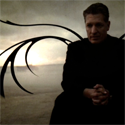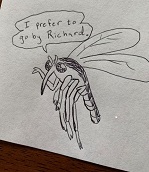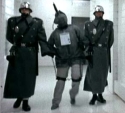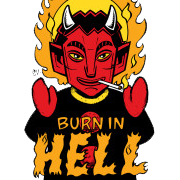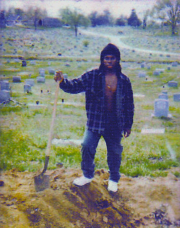|
I mean the guy is being honest about his personal reaction to the book so I don't want to bag on him too hard about it. It's understandable to be frustrated by a book sometimes. It just happens. Especially if you're not used to the particular genre or style of the work, but even if you are, sometimes you just have a bad trip or whatever. Dunno, sometimes I really hate a book on first read but a year later I pick it up and love it. All I can say is that I like McCarthy and he actually has a decent amount of range so if you liked the language but didn't like other aspects of the book, you might like some of his other books better like the ones that skew more towards genre work. OXBALLS DOT COM fucked around with this message at 03:23 on Aug 28, 2013 |
|
|
|

|
| # ? Apr 24, 2024 07:10 |
|
Not an Owl posted:Does this make me some horrible moron with the worst opinions? Nope! The points you raise are pretty fair ones and not at all horrible. In fact, I'd have no problem calling them pretty astute, especially pointing out the role the horses play in the overall theme. My own take: the horses in his Border Trilogy serve the same function that "carrying the fire" does in The Road (and in the last monologue in No Country for Old Men). That is, they're something that mankind has always valued, something that we've used as a tool for our own evolution--something that we have a connection to not just on an individual level but as a species. It's worth comparing his statement on horses in the first book with his point about wolves and cattle in the sequel: quote:The wolves in that country had been killing cattle for a long time but the ignorance of the animals was a puzzle to them. The cows bellowing and stumbling through the mountain meadows with their shovel feet and their confusion, bawling and floundering through the fences and dragging posts and wires behind. The ranchers said they brutalized the cattle in a way they did not the wild game. As if the cows evoked in them some anger. As if they were offended by some violation of an old order. Old ceremonies. Old protocols. Your intense horse parts (the equestrian jargon) serves to elevate the idea of the horses, the same way catechisms give religion its atavistic power. It's a renewal of ritual (something of some import in Blood Meridian). Compare that to the language McCarthy uses about the cows and why the wolves brutalize them but not the wild game, and you get two different views of civilization--one that works with nature and one that nature hates. Most of McCarthy's work is about civilization and man's place outside of it.
|
|
|
|
poo poo, that The Crossing quote gave me chills. Also, dunno if y'all know this but James Franco has made a Child of God movie. Gonna try and catch it at the New York Film Fest this fall.
|
|
|
|
Beyond sane knolls posted:poo poo, that The Crossing quote gave me chills. Yeah I think I heard of that while re-reading the wiki one day during my last read-through. I just hope it's done well and right; about the only thing I ask of McCarthy adaptations. I still think Blood Meridian deserves more time than a mere movie's length can convey. If I had to do it, for a multi-part series, I wouldn't end the first hour's chapter until the end of the first chapter; after the Toadvine fight against Old Sidney where the judge and his horse size him up. That's a long rear end time, but I really do think a long series is the best way to capture everything. Not all chapters would have their own hour mind you; although I do think the ex-priests recounting of the meeting with the Judge is another chapter that would deserve its own hour.
|
|
|
|
Not an Owl posted:And I know why he omitted quotation marks and traditional methods of writing dialogue, but I found it incredibly frustrating a couple times. Particularly, a scene with Grady, Rawlins, and Blevins, all using third-person pronouns. I had no Idea what happened during the scene at all because I just had no idea who was talking. They each have their own personality that comes through in their speech, so that's helpful to look towards when you're wondering who's talking when. Frostwerks posted:Yeah I think I heard of that while re-reading the wiki one day during my last read-through. I just hope it's done well and right; about the only thing I ask of McCarthy adaptations. I still think Blood Meridian deserves more time than a mere movie's length can convey. If I had to do it, for a multi-part series, I wouldn't end the first hour's chapter until the end of the first chapter; after the Toadvine fight against Old Sidney where the judge and his horse size him up. That's a long rear end time, but I really do think a long series is the best way to capture everything. Not all chapters would have their own hour mind you; although I do think the ex-priests recounting of the meeting with the Judge is another chapter that would deserve its own hour. When I consider Blood Meridian being made into a movie I think immediately of There Will Be Blood and specifically the first 5-10 minutes. Dry, desert landscape, no dialogue, no distracting music and every shot conveys what is needed. That scene is done so well and is one of my favorites of the movie. I think a longer movie length would be fine, given the right director. Fellwenner fucked around with this message at 09:11 on Aug 28, 2013 |
|
|
|
I have a request that sounds like a "help me with my homework" request, except I'm not a student.  (Maybe it's worse: I'm a library technician. (Maybe it's worse: I'm a library technician. The university I work at is putting on a semester-long project on war, and one day is going to be devoted to allowing people to read aloud from any work (fiction or non-fiction, poetry, etc.) on War in 15-minute blocks. I was conscripted to read, and immediately I thought of reading the Judge's speech on war that begins with the paragraph on "the ultimate trade" and culminates in "War is god." Trouble is, that won't take 15 minutes to read. Can anyone suggest another 2-3 page passage (either in Blood Meridian, or from another of McCarthy's works) that could serve as a good counterpoint to the Judge's speech? Something exemplifying mercy, or (as Wilfred Owen wrote) the pity of war? If I can't find anything else by McCarthy, I may read a passage out of Daniel Hallock's Hell, Healing, and Resistance about Claude Eatherly, the man responsible for calling in the weather report in preparation for the bombing of Hiroshima, and how he became crushed with guilt after the war for having a hand in all those deaths.
|
|
|
|
The only character in the book that I can remember who is seemingly anti-war is the old priest that tries to warn off the Kid and the others from trying to join Captain White's irregulars:The old man posted:
There's also the original ferry keeper, sort of, he tries to tell Glanton that local indians are friendly.
|
|
|
|
Rabbit Hill posted:I have a request that sounds like a "help me with my homework" request, except I'm not a student. If nonfiction is included, I really loved psychiatrist Johnathan Shay's "Achilles in Vietnam," a pretty definitive book about PTSD. There's a specific section where it talks about how war is almost a collaborative enterprise with both sides inadvertently working together to place the soldiers in "a condition of captivity and enslavement." quote:They have taught me that even down to the individual soldier and his squad, war is profoundly political, because it is about power. For soldiers in prolonged combat, war is the mutual struggle to paralyze or control the will of enemy soldiers by inflicting wounds and death and creating the terror of these. Some combat units had printed “calling cards” or “death cards,” the most common of which was the ace of spades. One veteran recalls, “We used to put it in the mouth of all the kills we got.” The domination that a soldier seeks over his enemy is as total as the domination a master has over a slave, aiming for fear to so completely grip the enemy that he flees in panic, surrenders, or is too terrified even to move, let alone resist. When such domination is complete, a battle is a “walkover.”
|
|
|
|
I have Achilles in Vietnam! I used it for a major paper I wrote as a psychology undergrad on the effect of the dehumanization of the enemy in the development of PTSD. (I remember a great anecdote of a vet tormented by hallucinations of a soldier he killed, seeing him appear at the vet's family dinners, and the hallucinations went away after Shay suggested the dead soldier was an honored guest at the dinner table.) Wow, you're the only other person I've encountered who's read it, and now (IIRC) it's out of print. That's a fantastic resource, and a great idea to pair that with the Judge's speech. Now to find it in my house... If I can't find it, maybe I'll just print out your post. 
|
|
|
|
Yeah, it's a great book. I got that quote off of the kindle edition of the book, so if nothing else you can probably get it that way.
|
|
|
|
Teaser for aforementioned Franco adaptation of Child of God http://www.indiewire.com/article/watch-james-francos-take-on-cormac-mccarthy-in-the-teaser-for-child-of-god
|
|
|
|
Rabbit Hill posted:I have a request that sounds like a "help me with my homework" request, except I'm not a student. Why not just continue until the end of that section. That's an extra page of text and still more or less about war.
|
|
|
|
Just finished Suttree and absolutely loved it. Partly because it seems to pre-date McCarthy describing everything as "like some [insert simile here]", which is a sentence construction I couldn't stop seeing in Blood Meridian once I'd noticed it (still love Blood Meridian though). One thing I'm curious about - earlier in the thread, someone said that what hit them hardest in Suttree was (end of book spoiler) Harrogate's death. Am I missing something here? As far as I could tell, the last we saw of Harrogate was him being on the run from the police after his payphone scam was rumbled? Were we meant to assume that the body in Suttree's houseboat was Harrogate? Because I didn't see anything to indicate that. Edit: Also, stop comparing black people with apes Cormac. Though I'm guessing that was more just portraying the characters' thoughts than McCarthy's own. Owlkill fucked around with this message at 10:50 on Sep 3, 2013 |
|
|
|
Owlkill posted:Just finished Suttree and absolutely loved it. Partly because it seems to pre-date McCarthy describing everything as "like some [insert simile here]", which is a sentence construction I couldn't stop seeing in Blood Meridian once I'd noticed it (still love Blood Meridian though). He got arrested and sent to the state pen. Thats at least the last time I remember hearing about him but I am not 100% sure.
|
|
|
|
Jewmanji posted:Teaser for aforementioned Franco adaptation of Child of God Word is it's pretty faithful to the book, really looking forward to this! Cine-Vue review, mild spoilers if you haven't read the book
|
|
|
|
Swarmin Swedes posted:He got arrested and sent to the state pen. Thats at least the last time I remember hearing about him but I am not 100% sure.
|
|
|
|
nooneofconsequence posted:You're right. However, Suttree had a vision that was seemingly only of people he knew who died, and yet Harrogate was there, so perhaps the reader got confused or took it as a premonition. I was the guy and my memory's a bit hazy, but I seem to remember when Harrogate's sister shows up, it's alluded that Suttree's trying to keep her from coming or looking inside his boathouse because her brother's long decomposing corpse is in there and there's never an explanation of how he died, just that Suttree comes back home and finds him there dead. At least that's the way I remember it, that was a few books ago, so I could be way off. ruddiger fucked around with this message at 20:23 on Sep 18, 2013 |
|
|
|
I've never read McCarthy before, but I'm 31 pages into The Road. This book is incredible. "Now call down your dark and your cold and be damned." is the best sentence I've ever heard/read.
|
|
|
|
ruddiger posted:I was the guy and my memory's a bit hazy, but I seem to remember when Harrogate's sister shows up, it's alluded that Suttree's trying to keep her from coming or looking inside his boathouse because her brother's long decomposing corpse is in there and there's never an explanation of how he died, just that Suttree comes back home and finds him there dead. At least that's the way I remember it, that was a few books ago, so I could be way off. I took the dead body to be the anti-Suttree.
|
|
|
|
Just posting to note that I'm going through No Country for Old Men again and every time I read the whole coin toss dialogue it gets better.
|
|
|
|
MondayHotDog posted:I've never read McCarthy before, but I'm 31 pages into The Road. This book is incredible. "Now call down your dark and your cold and be damned." is the best sentence I've ever heard/read. I remember hiring that from a a library and I just ended up lending it to people for and afternoon and they'd read it through non stop. Speaking of, the most amazing review of the book is Jeremy Clarkson's quote:It begins with a man and a boy walking down a road in cold weather. And it ends with a man and a boy walking down a road in cold weather. In between, not much happens. But it was brilliant. Even though it is not much thicker than a pamphlet and no longer than a warning notice on a train's lavatory door, it took me nearly a week to read. I kept going back over some of the phrases thinking: "That didn't work." But they do work.  edit: what bummed me about the film is they didn't have the baby on a spit scene in there. For me, that epitomized everything about that world.
|
|
|
|
McCarthy is pretty weird beach/vacation reading.
|
|
|
|
Thats why every time somebody asks me what I'm reading when it's a McCarthy books I respond with something more socially acceptable, like 120 Days of Sodom.
|
|
|
|
Has there been any literary criticism exploring the repeated "before man was, war waited for him" motif in Blood Meridian? I was skimming through the other day, and it appears that the idea is introduced in the mennonite's augury in the beginning and then repeated at least three times further along. Well, shoot, here -- page 40 posted:[spoken by the mennonite] "The wrath of God lies sleeping. It was hid a million years before men were and only men have power to wake it." page 147 posted:The judge looked about him. He was sat before the fire naked save for his breeches and his hands rested palm down upon his knees. His eyes were empty slots. None among the company harbored any notion as to what this attitude implied, yet so like an icon was he in his sitting that they grew cautious and spoke with circumspection among themselves as if they would not waken something that had better been left sleeping. page 248 posted:[spoken by the judge] "War was always here. Before man was, war waited for him." page 307 posted:[spoken by the judge] "Our animosities were formed and waiting before we two ever met." Just wondering what others have to say about that.
|
|
|
|
http://forums.somethingawful.com/showthread.php?threadid=3576074 Here's the link to the cinema discusso thread on The Counselor.
|
|
|
|
Hey thread, I'm reading The Crossing, and since I'm an ignorant unilingualist, I'm wondering if anyone has any links to a Spanish-English translation guide or something. I know there was one for the Spanish dialogue in Blood Meridian, but there is way more going on in this one. It is kinda fun figuring it out through the story, and I know I'm not missing much, but it's nice to learn new words.
|
|
|
|
If you have a smartphone or tablet, install Google Translate and point the camera at the page when you run across some Spanish. That's how I got through the Border Trilogy.
|
|
|
|
|
Notes on Blood Meridian has a section that translates all the non-English words and phrases in the book.
|
|
|
|
Stupid question, in Blood Meridian Why do they draw lots after fighting the Mexican army when they just end up leaving the wounded anyway, or were they meant to kill the wounded and then catch up?
|
|
|
|
LordPants posted:Stupid question, in Blood Meridian The heaviest part, as I remember it, is that the Kid can't bring himself to actually DO it. So, hate to be that guy. Something like that. Dr. Faustus fucked around with this message at 04:04 on Nov 19, 2013 |
|
|
|
On The Crossing and the alguacil. Was it just me or did anyone else get the feeling that the alguacil and Judge Holden were the same person? The fascination with coining and power plays was similar to the judge dominating Toadvine at the end in buying his hat, and the strange figure hammering coins with the judge in the kid's dreams. The alguacil also seemed to admire Billy for killing the wolf and facing off against the crowd, as if to stand in war against the people, and definitely had an eye for Billy the way the judge viewed the kid. But what really stood out was that alguacil is essentially Spanish for judge. Shitenshi fucked around with this message at 09:19 on Jan 9, 2014 |
|
|
|
Thank god this thread got bumped and now I really gotta read the border trilogy. Not a lot of word in this thread on The Orchard Keeper.
|
|
|
|
Frostwerks posted:Thank god this thread got bumped and now I really gotta read the border trilogy. Not a lot of word in this thread on The Orchard Keeper. I personally really disliked The Orchard Keeper. Having now read all of ten of his novels, I'd say that it's his weakest. It definitely has McCarthy's voice and it certainly has beautiful prose in many places, but I found the plot of the novel dull and uninteresting. As a reader, I never felt a strong connection with any of the three main characters. Things happened and then more things happened and nothing really felt like it came together, leaving the book feeling like some fruitless exercise in patience. Not to say a book needs to have a strong central plot to be interesting, but I felt Suttree was far superior in that sense. There were sections of The Orchard Keeper I enjoyed, but in the end I just felt bored and disappointed. Perhaps I missed something, though. I've read and re-read many of McCarthy's other novels to try and get more and more out of them, so my unengagement with this book might be hurting my interpretation. On the other hand, the Border Trilogy is amazing. I've always felt The Crossing was one of McCarthy's most intense and moving works and cannot recommend it enough.
|
|
|
|
I just finished the first chapter of All The Pretty Horses (Which is to say, about 100 pages  ) and I am really liking it so far. There are so many little McCarthyisms that pop up in the books, like in No Country For Old Men and All The Pretty Horses they both say they got something "from the gettin' place". ) and I am really liking it so far. There are so many little McCarthyisms that pop up in the books, like in No Country For Old Men and All The Pretty Horses they both say they got something "from the gettin' place".
|
|
|
|
LordPants posted:I just finished the first chapter of All The Pretty Horses (Which is to say, about 100 pages I noticed that while watching the movie and knew instantly that it was in the book. e: actually there are Frostwerks fucked around with this message at 05:35 on Jan 11, 2014 |
|
|
|
I actually just started reading The Sound and The Fury (doing a course comparing Faulker, Morrison and McCarthy), and within twenty pages, when asked where he got a quarter, Luster claims he "got it at the getting place." Definitely easy to see how Faulkner influenced McCarthy
|
|
|
Jeep posted:I actually just started reading The Sound and The Fury (doing a course comparing Faulker, Morrison and McCarthy), and within twenty pages, when asked where he got a quarter, Luster claims he "got it at the getting place." It's almost like that was a common phrase in the rural South during the early 20th century.
|
|
|
|
|
Orchard Keeper had its problems, notably how he would start using a long detailed description of something totally unsuited to the current situation (at one point, a guy searching at a crime scene is compared to sifting through galaxies), but for all its problems, was pretty good for a first novel. It still had its problems, and I came away stunned that this was the same guy who did Blood Meridian, but still pretty good. Outer Dark though. Man, that was a stinker.
|
|
|
|
Jeep posted:I actually just started reading The Sound and The Fury (doing a course comparing Faulker, Morrison and McCarthy), and within twenty pages, when asked where he got a quarter, Luster claims he "got it at the getting place." The name that doesn't get brought up enough when discussing McCarthy influences in my mind is Bierce. Hell at one point in I believe Suttree he describes a knot in wood as being like someone peeping through it. I think he even says peeping pervert but I could be wrong and don't have the book at hand. Just such a thing plays a pivotal role in one of Bierce's short stories. There's much more than just that one little thing too, mostly I feel there is a similarity in language at some points too.
|
|
|
|

|
| # ? Apr 24, 2024 07:10 |
|
I read The Stonemason recently; it was very good.
|
|
|








